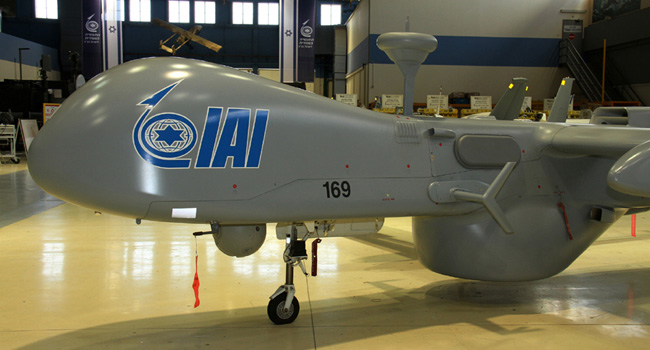A compact three dimensional (3D) high frequency (HF) radio direction finder technology developed by a team of communication intelligence (COMINT) experts at Israel Aerospace Industries’ (IAI) Elta Systems group enables law enforcement and military users to effectively intercept, locate and tap HF radio transmissions hitherto performed only by stationary monitoring stations that are typically operated by national intelligence agencies. The company is demonstrating the arrow-shaped antennae (designated EL/K-7065) on the Heron I Unmanned Aerial System (UAS) on display at the Paris Air Show this week. Defense-Update reports.
HFDF systems typically locate targets at two dimensions (geographical location) using huge antennae farms, yet, these methods relying on sky waves, lack providing target elevation data. At a weight of merely 3 kilograms and the size of 30×50 cm (11.8 by 19.6”), the arrow-shaped 3DHFDF uses multiple antennae picking the same HF signals both in sky waves and direct propagation, performing ‘vector processing’ to fix an emitter location within 160 millisecond.
According to the system’s developer, the 35 cm long conformal configuration of the system system can be also be used on ship-born and ground platform applications. The system that was developed in the past 10 months have already gone through initial tests. With the prototype surpassing expectations the team plans to conduct more tests in the coming months. Discussed with only few potential customers, the system has attracted much interest. The same concept has also been applied to conformal antennas, that can be installed on marine vessels and ground vehicles, enabling low radar cross section (RCS) and minimize body obstruction.
ELTA’s unique capabilities, demonstrated by the ELK- 7065 3D HF COMINT system, allow for better classification and distinction of incoming signals. The maritime and ground vehicle antennas are merely 35 centimetres (13.7 In) long.
Its advanced technology requires comparatively very small antennas for aerial purposes or small pick-up antennas for shipborne and ground platforms in order to provide an HF COMINT and geolocation capability which up to now, was provided only by antenna arrays measuring tens of meters.
As a COMINT system, EL/K-7065 tags and labels signal identifiers such as power, frequency, modulation, geo-location and polarization, in order to provide quick labelling and identification of the received signals, creating a reliable Electronic Order of Battle (EOB) picture. In addition, the system can also monitor selected conversations, providing valuable intelligence.
Parallel to the growth in satellite communications, and the law enforcement agencies are witnessing a growth in use of HF communications, for its advantage in long-range, Beyond Line of Sight communications without relying on expensive satellite links. It is also becoming popular communications with illegal elements, realizing the lack of law enforcement agencies to employ tactical COMINT to detect and locate such transmissions – an activity easily performed with SIGINT based on satellite communications. HF communications has the advantage of using sky wave propagation to link over great distances, or propagate well within urban or forested terrain, enabling close-range communications utilizing ground waves. The main limitation of HF communications, being the quality of service, has been improved in recent years, with the advent of related technologies such as Automatic Link Establishment (ALE).
Source: Defense-Update

Elta Systems’ EL/K-7065 3D HF Direction Finder (3DHFDF) mounted on the IAI Heron I drone. Photo: IAI
No comments:
Post a Comment